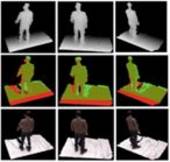
(irregularly, winter term)
Wir suchen in Systemen nach solchen Fehlern, die beim Testen unentdeckt bleiben. Wir servieren solide Theorie mit der notwendigen Prise Pragmatik, um einem wirklich herausfordernden Problem interessante und praktisch einsetzbare Lösungen abzugewinnen. Damit leisten wir einen wichtigen Beitrag zur Zuverlässigkeit von IT-Systemen und lernen viele leistungsstarke Algorithmen kennen, die sicher auch anderswo einsetzbar sind.
(irregularly, winter term)
Das Modul vermittelt grundlegende Konzepte und Techniken zum Entwurf und zur Analyse von Algorithmen. Insbesondere werden effiziente exakte Algorithmen, parallele Algorithmen, randomisierte und approximative Algorithmen, parametrisierte Algorithmen und die entsprechenden Komplexitätsklassen behandelt. Der Kryptographie-Teil beschäftigt sich mit Verfahren zur Geheimhaltung und zur Gewährleistung der Authentizität und der Integrität von Nachrichten und Daten. Der Schwerpunkt ist die asymmetrische (Public Key) Kryptographie, in welcher Kenntnisse aus der Komplexitätstheorie eine entscheidende Rolle spielen.
(irregularly, winter term)
This module is an introduction to the interdisciplinary research field of systems biology - the application of systems theory to biological systems. Using experimental data and information from databases and publications, systems biology investigates biological processes related to biotechnological and biomedical applications. This module introduces basic techniques for mathematical modelling and computer simulations of nonlinear dynamical systems in the life sciences. Students interested in systems biology should have some background in mathematics and should not be afraid to broaden their horizon towards biology. This module can be complemented by the module BioSystems Modelling and Simulation.
(irregularly, winter term)
The lecture deals with varioustechnical and organizational aspects of network security. Technical aspects are devices like firewalls, systems for detecting intrusions, proxies, VPNs etc., which are installed and maintained to increase security.
The organizational aspects are defined and to be observed work guidelines for people, which are also to increase security.
- Introduction: protection goals, taxonomy of possible attacks, identification of general risks, basics of security and technical components for defence
- Technical aspects: Firewalls, intrusion detection systems, proxies, virtual private networks (VPNs), public key infrastructure (PKI), network device security, computer security, network forensics
- Organizational aspects: Security processes, policy and security design, policy development and application, assessment, human aspects and social engineering, policy enforcement, disaster recovery and continuity planning, certification.
(irregularly, winter term)
Heutige Anwendungssysteme sind in der Regel nicht auf einen einzelnen Rechner beschränkt, sondern laufen auf mehreren Rechnern, die miteinander vernetzt sind und keinen gemeinsamen physikalischen Speicher besitzen. Algorithmen für solche "Verteilten Systeme" sind aufgrund der in diesen Systemen auftretenden Phänomenen deutlich komplexer als vergleichbare zentralisierte Algorithmen. Die Vorlesung gibt einen Überblick über die in verteilten Systemen auftretenden konzeptionellen Probleme und behandelt algorithmische Lösungsmöglichkeiten für diese.
(irregularly, winter term)
Data play a central role in modeling and simulation.To analyze, calibrate, and validate a simulation model, a multitude of different simulation experiments can be executed which rely on diverse data. At the same time, these simulation experiments may reveal important information about the data.The lecture gives an overview of experiment design methods, data analysis methods, as well as different types of simulationexperiments, including sensitivity analysis, statistical model checking, optimization, parameter estimation and uncertainty quantification. Workflow and provenance methods support the replicability of simulation studies and the assessment of simulation products.
(irregularly, winter term)
“The increasing importance of designing spaces for human communication and interaction will lead to expansion in those aspects of computing that are focused on people, rather than machinery. The methods, skills, and techniques concerning these human aspects are generally foreign to those of mainstreamcomputer science, and it is likely that they will detach (at least partially) from their historical roots to create a new field of ‘interaction design’” (T. Winograd, 1997).
(irregularly, winter term)
DigBib/MMIR ist eine Veranstaltung der Universitätsbibliothek Rostock (Sebastian Schick, Ilvio Bruder) in Kooperation mit dem Lehrstuhl Datenbank- und Informationssysteme (Holger Meyer).
Wir behandeln die Weiterentwicklung relationaler Datenbanksysteme zu Systemen, die komplexere Dokumente langfristig verwalten können.
Im ersten Teil der Vorlesung wird es um Text-Dokumente und ihre Beschreibung mit Metadaten gehen. Wir werden neben den Standards für digitale, wissenschaftliche Bibliotheken auch auf Anforderungen für die Verwaltung von Consumer-Bibliotheken wie elektronischen Zeitschriften eingehen. Die behandelten Teilprobleme reichen von der Integration von Forschungsdaten (Messdaten) in die Dokumente bis zu Fragen des Urheberrechts bei selbst erstellten Fotos.
Im zweiten Teil werden wir uns um Multimedia-Dokumente kümmern. Ausgehend von relationalen Datenbanksystemen werden bereits im SQL:1999-Standard Konzepte eingeführt, um Multimedia-Objekte zu modellieren, zu komprimieren und nach ihnen suchen zu können. An Beispielen wie Musik und räumlichen Daten werden diese Konzepte erläutert. Es werden auch ausgewählte Suchstrukturen und -verfahren zur effizienten Suche behandelt.
In den Übungen werden unter anderem Suchwerkzeuge und Systeme für Digitale Bibliotheken erklärt, demonstriert und benutzt.
(irregularly, winter term)
In diesem Jahrzehnt hat die Grundlagenforschung im Bereich Datenbanksysteme durch Big Data und Data Science einen massiven und überraschenden Schub bekommen. Beschäftigte man sich in der Datenbank-Grundlagenforschung früher mit Datenbankenturf, Anfrageoptimierung und der Sicherheit und Mächtigkeit von Anfragesprachen, so sind nun Anwendungsbereiche wie Datenaustausch, Integration heterogener Daten, Evolution von Daten und Datenstrukturen, die Suche nach den Quelldaten für eine Datenbankauswertung (Provenance Management), eine möglichst datensparsame und damit datenschutz-gerechte Anfrageauswertung die Ausgangspunkte für Fragestellungen der Datenbank-Grundlagenforschung.
In der Vorlesung „Grundlagen der Datenbankforschung“ (GDBF) werden wir diese Anwendungsbereiche aufgreifen und zunächst immer in anwendungsorientierten Kapiteln das Problem erläutern, bevor wir im darauffolgenden Kapitel dann die Lösung eines Kernproblems mit Hilfe von Techniken aus der aktuellen Grundlagenforschung erklären.
Zu Beginn der Vorlesung werden wir in einem zweiwöchigen Crashkurs die wichtigsten Begriffe aus der Sommersemester-Master-Vorlesung „Theorie relationaler Datenbanken“ wiederholen, deren Konzepte auch in der modernen Datenbankforschung wieder auftauchen.
Die Vorlesung wird mit (Tafel-)Übungen angereichert, damit die vorgestellten Techniken an kleinen Beispielen angewendet werden können.
(irregularly, winter term)
Cognitive Science has its roots in psychology, linguistic, philosophy and in computer science. Nowadays, quite a lot information processing or knowledge processing models are funded on psychological insights from the field of Cognitive Science. In this lecture, we will give an introduction to the broad field of Cognitive Science, covering aspects of human cognition and how these aspects have been used for computer models of cognition. We learn about psychological and medical basics and follow the path to artificial intelligence (AI). Models for information processing and knowledge elicitation will be introduced and investigated. The examples used in this lecture are related to current trends in AI research, same as to expert systems development, which is a rather traditional field in modeling cognition.
(irregularly, winter term)
In der Lehrveranstaltung werden die grundlegenden Konzepte und Methoden für die Verarbeitung von Daten mithilfe maschineller Lernverfahren eingeführt.
Nach einer Einführung in das Thema werden zunächst die Grundlagen der Signalverarbeitung sowie die Gewinnung und Analyse von abstrakteren Merkmalen aus den Rohdaten behandelt.
Im Anschluss werden einzelne Ansätze und Lernverfahren im Detail untersucht. Zu diesen gehören:
- Bayes’sche Entscheidungstheorie
- Parameterschätzung
- Nichtparametrische Methoden
- Support-Vector Machines
- Nichtmetrische Methoden: Entscheidungsbäume
- Algorithmenunabhänge Verfahren
(irregularly, winter term)
Cloud computing is a new paradigm for distributed systems that allows to flexibly use hard-and software components over a network such as the Internet. It is, for example, possible to deal with load peaks of applications that run in the cloud by dynamically scaling compute, memory, and network resources at runtime, while still paying only for the actually used resources. Cloud computing does not only change the development and the architecture of future application systems, but also the related business processes and models.
The lecture gives an overview of the concepts and architectures in the area of cloud computing and deals with different cloud-based approaches. Underlying technologies, such as virtualization and map reduce, are introduced and their role in the cloud architecture is discussed. Programming models for the cloud and current developments are also considered.
(irregularly, winter term)
Within the course „Artificial Intelligence VII“, we will cover approaches and algorithms for reasoning under uncertainty. Based on sensory inputs, which are usually noisy, intelligent systems have to decide which action to take.
During the course, the following approaches to tackle this problem are introduced:
- Markov Decision Processes (MDP)
- Partially Observable Markov Decision Processes (POMDP)
- Reinforcement Learning (RL) / inverse Reinforcement Learning (iRL)
- Advanced discriminative models (MRF, CRF)
- plan, intent and activity recognition
In addition, we will discuss the mathematics of the corresponding algorithms in detail.

